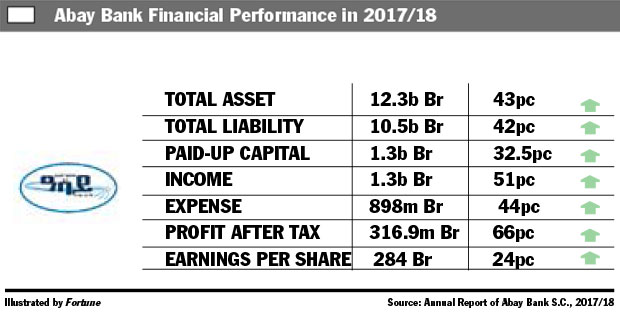
Radar | Nov 19,2022
Dashen, the second most profitable private commercial bank, netted 1.54 billion Br in profit over the last fiscal year, a 52.2pc growth from the previous year. The massive expansion far outstrips the industry average of 33pc.
Its earnings per share (EPS), the net profit divided by the total number of shares, also rose significantly by 21pc to 490 Br. Dashen's profit makes up 11pc of the total profit registered by the 16 private commercial banks during the past fiscal year, amounting to 13.9 billion Br.
This is a very significant figure by any standard, commented Abdulmenan Mohammed, a financial statement analyst.
"Such a performance was achieved not only in the face of a tough year but also with a considerable increase in paid-up capital," said Abdulmenan. “The management and shareholders of the Bank should be delighted with such a remarkable performance."
Neway Beyene, Dashen's board chairperson, saw the year for both its challenges and opportunities. He mentioned global trade, which suffered a deep contraction leading to lower demand for goods and services mainly in the hotel and tourism sector, local conflicts, political unrest and the pandemic as the major hurdles that faced the economy and the banking industry.
“The year has also witnessed the amendment of the investment law, revocation of the NBE Bill, the commencement of the T-Bill auction, and new directives including the movable property security, and allowing foreign firms in the lease business [as well as owning] large crop farms,” he remarked.
Asfaw Alemu, the president of Dashen, attributed the Bank's improved performance to the strategic plan launched two years ago.
"It helped us to segment customers, make structural changes, directed us to use a customer-centric approach, and launch new products," he said.
During the year, Dashen was able to increase its paid-up capital by 29.6pc to 3.5 billion Br. The massive paid-up capital injection did not impact its profit or shareholder returns despite the antagonistic relationship between the two at most financial institutions. The banking industry's capital, both state and private, reached 11.3 billion Br last year, registering 11.2pc growth.
Dashen's remarkable performance was driven by a significant increase in all revenues, excepting gains on foreign exchange dealings.
Its interest on loans, advances and National Bank of Ethiopia (NBE) bills, which were dismissed last year, soared by 35pc to 5.8 billion Br. Increased lending activities drove this growth. During the year, the firm disbursed loans and advances of 10.2 billion Br, an increase of 31.6pc.
Net fees and commissions income went up by 52pc to 1.3 billion Br. Gains on foreign exchange dealings plummeted to a loss of 341.9 million Br from the previously recorded income of 101.4 million Br.
“This is very shocking,” said Abdulmenan. “The management has got to do a lot of work to avoid such massive losses.”
Asfaw concurs, saying that the management has already defined focus areas to address this issue.
"We'll work on building our forex assets," he said. "We'll also focus on working with businesses that will bring in more foreign currency."
During the past fiscal year, the Bank has brought in 560 million dollars in foreign currency.
Neway also mentioned that the increasing gap between the demand and supply of foreign currency was the major challenge last year.
Dashen mobilised 53.4 billion Br in deposits, an increase of 20pc that caused the loan-to-deposit ratio of the Bank to rise to 79.8pc from 72pc.
This is a considerable increase, according to Abdulmenan.
"Dashen should be careful against a further increase as it may undermine its liquidity," said Abdulmenan.
Asfaw attributes the repeal of the NBE Bill as the main reason for the rise in loans and advances. The loan-to-deposit ratio rose as deposits also grew last year, according to him.
Dashen’s provision for the impairment of loans and other assets spiked to 59.8 million Br from the previous year's figure of 14.1 million Br.
Despite the increase, the figure is reasonable for a bank as big as Dashen, according to the expert.
The rise in this line item indicates that loans and advances at the Bank are increasing, according to Asfaw.
The Bank's expenses grew significantly. Interest paid on deposits soared by 27.6pc to 2.5 billion Br. Salaries and benefits increased by 35.2pc to 1.9 billion Br. In comparison, other operating expenses went up by 17pc to one billion Birr.
During the past fiscal year, Dashen opened 10 new branches, increasing its branch network to 423. It also recruited 273 new employees, bringing its total number of staff to 9,970. Last year, the banking industry underwent a considerable branch network expansion, increasing the total number of branches by 947 to 6,511.
Dashen's assets increased by 21.5pc to 68.3 billion Br. Its investments in NBE five-year bonds dropped by 9.6pc to 11.1 billion Br. These investments account for 16.3pc of total assets and 21pc of total deposits of the Bank.
Liquidity analysis indicates that the liquidity level of Dashen increased in value and relative terms. Its cash and bank balances increased by 56.6pc to 6.1 billion Br. Its ratio of liquid assets to total assets increased by two percentage points to 8.9pc. Dashen's ratio of liquid assets to total liabilities also grew to 10.1pc from 7.8pc.
Dashen has capital and non-distributable reserves of 7.5 billion Br and a capital adequacy ratio (CAR) of 17.9pc.
PUBLISHED ON
Feb 13,2021 [ VOL
21 , NO
1085]

Fortune News | Feb 22,2019

Fortune News | Oct 14,2023

Delicate Number | Apr 26,2025

Radar | Feb 24,2024

Fortune News | Nov 21,2018

Dec 22 , 2024 . By TIZITA SHEWAFERAW
Charged with transforming colossal state-owned enterprises into modern and competitiv...

Aug 18 , 2024 . By AKSAH ITALO
Although predictable Yonas Zerihun's job in the ride-hailing service is not immune to...

Jul 28 , 2024 . By TIZITA SHEWAFERAW
Unhabitual, perhaps too many, Samuel Gebreyohannes, 38, used to occasionally enjoy a couple of beers at breakfast. However, he recently swit...

Jul 13 , 2024 . By AKSAH ITALO
Investors who rely on tractors, trucks, and field vehicles for commuting, transporting commodities, and f...

Oct 25 , 2025
The regulatory machinery is on overdrive. In only two years, no fewer than 35 new pro...

Oct 18 , 2025
The political establishment, notably the ruling party and its top brass, has become p...

Oct 11 , 2025
Ladislas Farago, a roving Associated Press (AP) correspondent, arrived in Ethiopia in...

Oct 4 , 2025
Eyob Tekalegn (PhD) had been in the Governor's chair for only weeks when, on Septembe...